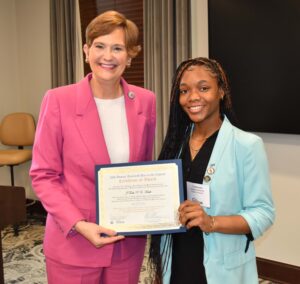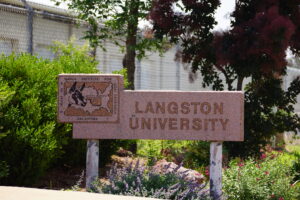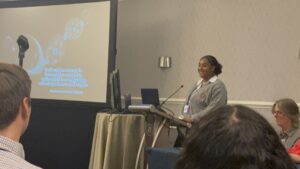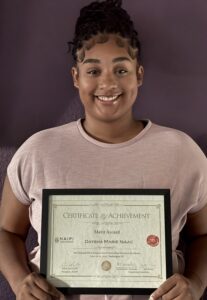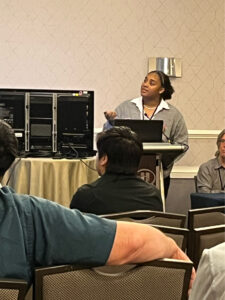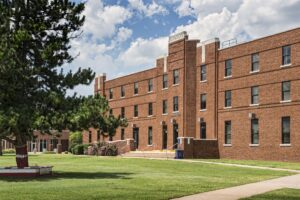
Faculty research panel encourages students to get involved with research, provides insights for next steps
by Ellie Melero
Six Langston University faculty researchers from various departments came together to share their research and graduate school experiences with students during a discussion panel on Nov. 11, encouraging students to get involved with undergraduate research and providing insights on how to do so.
“It was just an opportunity for us to let (students) know that we also go through these different steps,” said Dr. Desmond Delk, the coordinator and moderator for the event. “They, too, can do it, and we’re resources for them. And really, the main thing is to also get them interested in research and let them know how research looks different.”
Dr. Delk, the chair of the Department of Health, Physical Education and Recreation (HPER), brought together faculty with a variety of research interests for the “Scholarly Works in Progress: An Early Career Perspective” research panel. Dr. Chukwuebuka Ezeakacha, the director of LU choral activities; Dr. Lindsey Davis, the chair of the Department of Chemistry; Yaisa Mann, a professor in the Department of English; Dr. Brittany Mays, a professor in the HPER Department; Dr. Emisha Maytubby, the chair of the Department of Family and Consumer Sciences; and Alexis Montague, a professor in the Department of Public Health, all participated in the panel.
The panelists talked to students about their educational and research backgrounds, which covered topics ranging from sub-Saharan African music to infectious diseases. The faculty members discussed why they chose to pursue their areas of study and research interests, some of the challenges they’ve had to overcome while conducting research, and then answered student questions about research.
Junior biology major Kiaorie Stewart-Ricks already has some experience conducting research thanks to an internship he had this past summer, and he plans to continue pursuing research as he works toward his goal of becoming a sports physician. He was excited for a chance to listen to the LU faculty’s stories, especially those who are themselves LU alumni.
“I wanted to just come see my fellow researchers that are alums of Langston (University) and see what their challenges were doing research and the things they went through,” Stewart-Ricks said. “I thought maybe I could get some insight through their challenges.”
Providing students insight into life as a researcher was part of Dr. Delk’s goal when he coordinated the event. He wanted to give students a chance to learn about what LU’s faculty do outside of class, and he hoped they could inspire some of the students to get involved with research early.
Cynsere Boyd, a senior public health major with a minor in corrections, came to the event because she hoped to hear some advice about how to manage research and school. Like Stewart-Ricks, she enjoyed listening to the faculty members’ stories, and she appreciated the advice they shared regarding mentors and peer collaboration.
“I think the panel was a great opportunity to show us how we can make it through college and find other routes for grad (school) and figure out how to make connections with different peers,” Boyd said.
As an 1890 land-grant institution, Langston University takes pride in the high-quality research conducted at all three campuses, and there are countless ways for students of any year or major to get involved with research during their time at LU. Scores of students attended the mid-day panel, proving that research is a big draw for many students.
Dr. Delk made sure to take advantage of the time they had with students to not only share the panelists’ research, but also to share summer research internship opportunities. Many students expressed appreciation for this addition as well as for the advice the faculty shared.
“I think it went well,” Dr. Delk said. “The faculty members gave some great insight. Some of the students had some good questions. We connected them to resources, summer programs, we gave them access to some of our own personal publications.
“So, I’m encouraging students to ask questions, connect with people, and just dive into this idea of research.”


